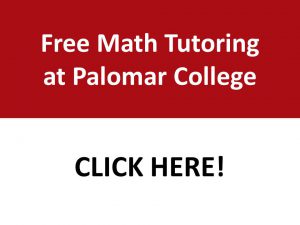Math Courses Palomar Catalog Listing
MATH 1 Just-In-Time Support for Exploring Mathematics
.5 units/1½ hours laboratory/Corequisite: MATH 100/Non-degree Applicable
A review of core prerequisite skills, competencies, and concepts for Exploring Mathematics (Math 100). Designed to provide just-in-time support for students concurrently enrolled in Math 100. Throughout the course, college success content will be integrated with mathematics topics. This course incorporates active learning techniques involving multiple modalities that include individual and/or group active learning projects/activities and/or student presentations.
MATH 11 Just-in-Time Support for College Algebra
2 units/2 hours lecture/Prerequisite: Eligibility determined through the Math placement process/Corequisite: MATH 110/Note: Pass/No Pass grading only/Non-degree Applicable
A review of core prerequisite skills, competencies, and concepts for College Algebra. Designed to provide just-in-time support to students concurrently enrolled in Math 110, College Algebra. Throughout the course, college success content will be integrated with mathematical topics. Course includes active learning techniques involving multiple modalities that include individual and/or group active learning projects/activities and/or student presentations.
MATH 13: Just-In-Time Support for Calculus for Business and the Social Sciences
2 unit/2 hours lecture/Prerequisite: Eligibility determined through the Math placement process/Corequisite: MATH 130/Note: Pass/No Pass grading only/Non-degree Applicable
A review of the core prerequisite skills, competencies, and concepts for Calculus for Business and the Social Sciences. Intended as just in time support for students who are concurrently enrolled in MATH 130, Calculus for Business and the Social Sciences. Review topics include College Algebra skills and concepts. Throughout the course, college success content will be integrated with mathematical topics. Course includes active learning techniques involving multiple modalities that include individual and/or group active learning projects/activities and/or student presentations.
MATH 14 Support for Quantitative Reasoning
2 unit/2 hours lecture/Prerequisite: Eligibility determined through the Math placement process/Corequisite: MATH 101/Note: Pass/No Pass grading only/Non-degree Applicable
The fundamental skills needed to understand the concepts, formulas, and graphs used in Math 101, Quantitative Reasoning, are studied. This course includes operations with and conversions between fractions, decimals, and percents. Algebraic reasoning will include working with variables, translating verbal expressions into variable expressions, exponents, square roots, graphing functions in the coordinate plane, and solving linear equations. Throughout the course, college success content will be integrated with mathematical topics.
MATH 20: Support for Elementary Statistics
2 unit/2 hours lecture/Prerequisite: Eligibility determined through the Math placement process/Corequisite: MATH 120/Note: Pass/No Pass grading only/Non-degree Applicable
The core mathematical skills needed to understand the concepts, formulas, and graphs used in transfer-level statistics are studied. This course integrates numeracy, proportional reasoning, algebraic reasoning, and functions. It develops conceptual and procedural tools that support the use of key mathematical concepts in a variety of statistical contexts. Throughout the course, college success content will be integrated with mathematical topics.
MATH 100 Exploring Mathematics
3 units/3 hours lecture/Prerequisite: A minimum grade of ‘C’ in Math 56 or Math 60 or eligibility determined through the math placement process or Corequisite: Math 1/Transfer acceptability: CSU; UC
Selected topics from logic, modern algebra, number theory, and geometry. Designed to give the student an introduction to the structure of mathematics and its applications. Recommended for liberal arts students.
MATH 101 Quantitative Reasoning
3 units/3 hours lecture/Prerequisite: A minimum grade of ‘C’ in Math 56 or Math 60 or eligibility determined through the math placement process or Corequisite: Math 14/Transfer acceptability: CSU; UC
This course is designed to give students mathematical tools for understanding the modern world. The course includes linear and exponential functions to model growth and decay processes and the effect of compounding interest in personal finance situations. Elementary probability theory to calculate the likelihood of events and descriptive statistics will be used to organize and make sense of data sets.
MATH 105 Concepts of Elementary Mathematics I
3 units/3 hours lecture/Prerequisite: A minimum grade of ‘C’ in Math 56 or Math 60 or eligibility determined through the math placement process /Transfer acceptability: CSU; UC
Selected topics from the real number system including properties and operations with integers and rational numbers as fractions and decimals. Additional topics include problem solving, numeration systems, number theory, and topics in logic and set theory. Recommended for prospective teachers.
MATH 106 Concepts of Elementary Mathematics II
3 units/3 hours lecture/Prerequisite: A minimum grade of ‘C’ in Math 105/Transfer acceptability: CSU; UC
An extension of Mathematics 105, including selected topics from two-and-threedimensional geometry, motion geometry, and measurement. Recommended for prospective elementary and junior high school teachers, parents, and liberal arts students.
MATH 110 College Algebra
4 units/4 hours lecture/Prerequisite: A minimum grade of ‘C’ in Math 56 or Math 60 or eligibility determined through the math placement process/Transfer acceptability: CSU; UC
Study of the behavior and characteristics of functions from graphic, numeric, analytic, and applied perspectives, including general polynomial functions, rational functions, exponential and logarithmic functions, and sequences. Systems of equations in several variables with an emphasis in matrix solutions.
MATH 115 Trigonometry
3 units/3 hours lecture/Prerequisite: A minimum grade of ‘C’ in Math 56 or Math 60 or eligibility determined through the math placement process/Transfer acceptability: CSU
The trigonometric functions and their applications including emphasis on the analytical aspects, identities, and trigonometric equations.
MATH 120 Elementary Statistics*
4 units/4 hours lecture/A minimum grade of ‘C’ in Math 56 or Math 60 or eligibility determined through the math placement process or Corequisite: Math 20/Transfer acceptability: CSU; UC
The use of probability techniques, hypothesis testing, and predictive techniques to facilitate decision-making. Topics include descriptive statistics, probability and sampling distributions, statistical inference, correlation and linear regression, analysis of variance, chi-square, and t-tests, and application of technology for statistical analysis, including interpretation of the relevance of the statistical findings. Applications using data from disciplines including business, social sciences, psychology, life science, health science, and education.
MATH 126 STEM Precalculus I – College Algebra
4 units/3 hours lecture, 3 hours laboratory/Prerequisite: A minimum grade of ‘C’ in Math 56 or Math 60 or eligibility determined through the math placement process/Transfer acceptability: CSU; UC
The first course of a two-semester sequence designed to prepare STEM students for calculus. The course covers advanced algebra topics, including functions and their properties. Focus is on linear, quadratic, polynomial, rational, exponential and logarithmic functions, and systems of equations and inequalities, including rate of change and explicit covariational reasoning to investigate and explore relationships between quantities and how these relationships change. Students solve contextualized problems individually and in teams to gain a deeper understanding of functions and their applications.
MATH 127 STEM Precalculus II – Trigonometry and Analytic Geometry
4 units/3 hours lecture, 3 hours laboratory/Prerequisite: A minimum grade of ‘C’ in Math 126 or Math 110 or eligibility determined through the math placement process/Transfer acceptability: CSU; UC
The second course in a two-semester sequence designed to prepare STEM students for calculus. This course covers basic concepts of analytic geometry and trigonometry, including definitions and properties of trigonometric functions. Students use multiple representations of functions, rate of change and explicit covariational reasoning to investigate and explore relationships between quantities and how these relationships change. Topics include solutions of applied problems using right triangles, graphs of trigonometric functions, trigonometric identities, trigonometric equations, inverse trigonometric functions, polar coordinates, conics, systems of nonlinear equations and sequences and series. Students model and solve contextualized problems individually and in teams to gain a deeper understanding of analytic geometry, trigonometric functions, and applications.
MATH 130 Calculus for Business and the Social Sciences
4 units/4 hours lecture/Prerequisite: A minimum grade of ‘C’ in Math 110 or Math 126 or eligibility determined through the math placement process/Transfer acceptability: CSU; UC
Functions and their graphs including exponential and logarithmic functions, single variable calculus, limits, differentiation, integration and their applications, multivariable calculus, with application to business, social sciences, and behavioral science.
MATH 135 Precalculus Mathematics
5 units/5 hours lecture/Prerequisite: A minimum grade of ‘C’ in Math 115 or eligibility determined through the math placement process/Transfer acceptability: CSU; UC
Designed for students who intend to take calculus. Emphasizes study of the behavior and characteristics of functions from graphic, numerical, analytic, and applied perspectives. Includes trigonometric functions, general polynomial functions, rational functions, exponential functions, logarithmic functions, absolute value functions, functions with rational exponents, and sequences. Selected topics from analytic geometry and linear systems are also presented.
MATH 140 Calculus With Analytic Geometry, First Course
5 units/5 hours lecture/Prerequisite: A minimum grade of ‘C’ in Math 110 and Math 115 or Math 127 or Math 135 or eligibility determined through the math placement process/Transfer acceptability: CSU; UC
An introduction to analytic geometry, differentiation and integration of algebraic and transcendental functions of a single variable, and applications of differentiation.
MATH 141 Calculus With Analytic Geometry, Second Course
4 units/4 hours lecture/Prerequisite: A minimum grade of ‘C’ in Math 140/Transfer acceptability: CSU; UC
Continuation of MATH 140. Topics include definite integrals and their applications; methods of integration (including the use of modern computational technology as appropriate); indeterminate forms; improper integrals; sequences; infinite series; Taylor series; conic sections; polar coordinate; and parametric equations from analytic, graphic, and numeric perspectives.
MATH 197 Mathematics Topics
.5 – 4 units/Prerequisite: A minimum grade of ‘C’ in Math 56 or Math 60 or eligibility determined through the math placement process/Transfer acceptability: CSU; UC – Credit determined by UC upon review of course syllabus Topics in Mathematics.
Units awarded in topics courses are dependent upon the number of hours required of the student. Any combination of lecture and/or laboratory may be scheduled by the department. Refer to Class Schedule. , or eligibility determined through the math placement process See Class Schedule for specific topic offered. Course title will designate subject covered.
MATH 200 Introduction to Linear Algebra
3 units/3 hours lecture/Prerequisite: A minimum grade of ‘C’ in Math 141/Transfer acceptability: CSU; UC
Matrices, determinants, vectors, linear dependence and independence, basis and change of basis, linear transformations, and eigen values.
MATH 205 Calculus With Analytic Geometry, Third Course
4 units/4 hours lecture/Prerequisite: A minimum grade of ‘C’ in Math 141/Transfer acceptability: CSU; UC
Vectors in the plane and space, three-dimensional coordinate system and graphing, vector-valued functions and differential geometry, partial differentiation, multiple integration, and vector calculus.
MATH 206 Calculus With Differential Equations
4 units/4 hours lecture/Prerequisite: A minimum grade of ‘C’ in Math 205/Transfer acceptability: CSU; UC
A first course in ordinary differential equations from analytic, geometric, numeric and applied perspectives (including the use of modern computational technology as appropriate). Topics include exact, separable, and linear equations; initial value and boundary-value problems; systems of first-order equations; reduction of order; undetermined coefficients; variation of parameters; series solutions; and Laplace transforms.
MATH 245 Discrete Mathematics
3 units/3 hours lecture/Prerequisite: A minimum grade of ‘C’ in Math 130 or Math 140 and CSCI 112/Transfer acceptability: CSU; UC
The study of prepositional and predicate logic, number theory and methods of proof, elements of set theory, relations and functions, the Pigeonhole Principle, sequences, infinite sets, basic counting techniques, permutations, combinations, graphs and trees, and applications directed to the field of computer science.
* Course is also available in an online format.
† Course is also available in a hybrid format.



